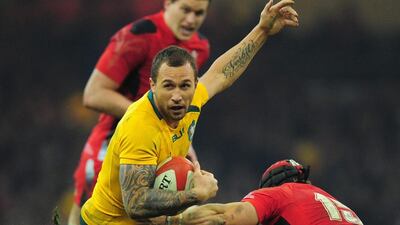There were some all too familiar lessons for the northern hemisphere’s leading nations after this year’s round of November Tests.
England, the hosts of the 2015 World Cup and the lone northern hemisphere winners of the tournament, were the only European side to beat one of the southern big three of world champions New Zealand, South Africa and Australia when they defeated the Wallabies at Twickenham this month.
They then gave world champions New Zealand a run for their money before, like everyone else in 2013, succumbing as the All Blacks became the first Test side in the professional era to win all their internationals in a single year.
But when teams are well-matched physically, the qualities of ball-playing skill and sheer rugby ‘nous’ still appeared decisive.
In creating New Zealand’s opening try against England at Twickenham, No 8 Kieran Read gave a pass that would have been the envy of many a back, although as All Blacks coach Steve Hansen suggested in reference to another superb piece of handling in that same match by centre Ma’a Nonu, if that’s the way you train and play, these moments become less of a ‘wow’.
South Africa have long been renowned for their power game, but in full-back Willie le Roux there was an indication the Springboks had a rapier as well as a bludgeon to call on.
And with Australia coach Ewen McKenzie laying down the law to his players off the field, by banning players from late-night drinking, yet letting them have their heads on it, with Quade Cooper’s fly-half masterclass in last weekend’s win over Wales the prime example, there were signs of a Wallaby revival.
“The deftness of his passing is what we lack not only in Wales but in the UK as a whole,” said Wales great Barry John, his praise of Cooper also a fairly damning indictment of Home Nations rugby.
Ireland sparkled against New Zealand before a lack of composure at the last prevented a first win over the All Blacks and doubts remain about their ability to ‘get back up’ in quick succession against the world’s best.
Wales, so dominant in Europe, found themselves deficient in the kind of behind the scrum skills they once prided themselves on while for Scotland and Italy the perennial problem of how to turn such possession as they can gather against top teams into tries remained.
England have a pack capable of matching the world’s best, but force and penalties alone, while they may win Tests, may not be enough to win a World Cup.
France, having lost three finals, can be considered the best team never to win a World Cup. There were glimpses in their defeats by New Zealand and South Africa of better days ahead, but only recording wins over Scotland and Tonga in 2013 was a poor return on the talent at their disposal.
The good news for everyone chasing the All Blacks is that no side has yet won back-to-back World Cups, with New Zealand yet to lift the trophy outside of their own country.
Indeed the two most recent World Cups in Europe (1999 and 2007) saw the All Blacks knocked out by France at their enthralling unpredictable best.
November also saw plenty of questions raised about rugby’s approach to the thorny issue of concussion and whether the sport’s proud boast of being a game ‘for all shapes and sizes’ was really credible in an age of physical ‘freaks’.
“They’ve become bigger and stronger, therefore the hits are bigger,” Wales great JPR Williams, an orthopaedic surgeon, told ESPN scrum.com.
Meanwhile Tests continued to take place outside the International Rugby Board’s designated November ‘window’, with the Welsh Rugby Union having to pay the Wallabies a reported £750,000 (Dh4.5m) to play in Cardiff last weekend.
For all its many traditions, rugby union is fast becoming like many another professional sports – if you want to know why something is happening, follow the money.

